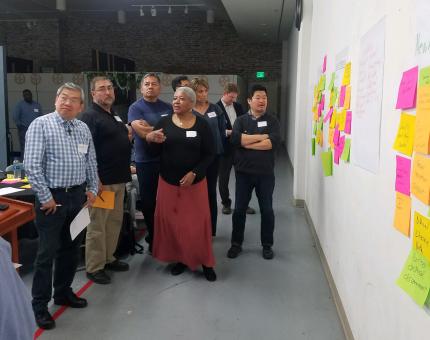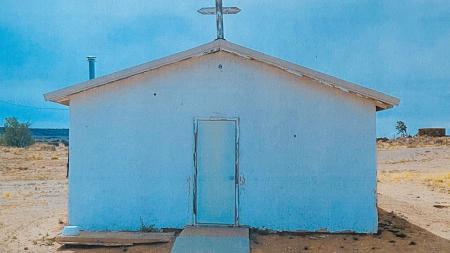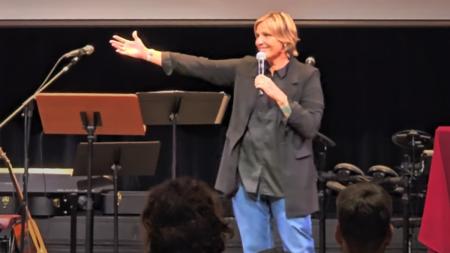Premier Gathering for EDFT

This is the second in a series of stories on new ministry approaches emerging out of the recent Glocal Mission Summit.
In the first gathering of its kind, Latino, African descent, Native American, Southeast Asian, Korean, and Chinese leaders had the chance to meet last week to share their experiences as pastors serving various ethnic minority congregations in the Christian Reformed Church in North America.
The first annual gathering of what is called the Ethnic Diversity Functional Team (EDFT) took place right after the Glocal Mission Summit, held April 1-3 at Ttokamsa Mission Church near downtown Los Angeles, Calif. The summit gathered leaders from around the world to talk about the future of missions work in the CRC in partnership with Resonate Global Mission.
“This is the first time we’ve had our ethnic minority leaders in the CRCNA together in one place to tell their stories so that we can all hear about the things people are doing and what is happening in their contexts,” said Reggie Smith, co-team leader with Moses Chung of the EDFT. Smith is director of the Office of Race Relations and the Office of Social Justice. Chung is director of mission innovation for Resonate Global Mission.
“This group is a good representation of how the CRC is changing,” said Smith.
It is also a group from whom the wider CRC can learn some lessons, he said. These leaders pastor diverse congregations in communities in which they must present the gospel to a range of people — Christians and non-Christians alike — in relevant, compelling ways.
“Many traditional churches are waking up to see that their numbers are shrinking and that they find themselves in a situation in which the nations are coming to their neighborhoods,” said Smith. “They are asking what they can do about that” — and they can turn to leaders such as those at the meeting for some answers in how to respond and adapt to changing circumstances.
Members attending the EDFT gathering represented the Black and Reformed Leadership Network; Consejo Latino; the Southeast Asian Pacific Islander group; First Nations; Korean; and the Chinese, East Meets West group.
As they met, the participants prayed, listened to one another’s stories, reflected on dreams and priorities for each ethnic group, brainstormed ways they might collaborate, and discussed strategy for the EDFT.
In a written statement about this gathering Chung said, “We want to encourage risk-taking among all leaders. We want to support the dreams of all ethnic groups that have come out of their own dreaming.”
As part of the meeting, leaders were asked to pair off and interview one another about their experiences in the CRC, reflecting on times when they felt excited about their involvement and times when they felt drained, disappointed, or hurt.
They were also asked to write down their answers on sticky notes and to post them on the wall. But before doing that, they had a general discussion.
Navajo leaders asked about the youth in their churches. The youth are vanishing, they said, and moving on. The church has to address this and find ways to retain young people. In addition, Native Americans often feel, they said, as if their churches are ignored and “erased from the white consciousness.”
Hispanic leaders said they appreciate being members of the CRC but asked that the church make more room for them as leaders and — especially because the number of Hispanic people is growing — allow them to step in and use their skills and understanding to catalyze and energize them and help the church to flourish.
Korean leaders asked the church to establish more ways in which new pastors could go much deeper in learning about the Reformed faith and the CRC itself.
A Chinese leader simply said, “There are hard issues with a lot of complexities.” But the leader did suggest trying to partner with East Meets West churches so that they can learn from each other.
Then the pastors posted some of their best and worst experiences in ministry on the wall. One wrote that he has had no bad experiences yet. Another said being mentored by a more seasoned pastor was helpful. Another appreciated the chance to join in leadership for the church.
As for tough experiences, here is what was shared: “Betrayal by classis”; “Youth Conference denied”; “New pastor position rejected”; “Ordination took 14 years.”
Denise Posie, the CRC’s director of Leadership Development: Women’s and Ethnic Ministries, was distressed to see some of the negative experiences there on the wall, especially the one saying it took 14 years for a pastor to be ordained.
But being able to share these experiences was a crucial aspect of this initial ethnic gathering, she said. Perhaps, she added, the pastors were more apt to open up to one another after spending three days together at the Glocal Mission Summit. And that was good.
“I think it was empowering to know that others face similar challenges and problems. Doing this helps to establish unity and encourages the sharing of ideas,” said Posie.
At Inspire 2019, set for Aug. 1-3 in Windsor, Ont., several of the ethnic leaders who attended the Los Angeles meeting will be holding workshops in which they discuss the challenges and joys of serving ethnic ministry churches in the CRC.
During a break at the ethnic leaders conference, Jose Rayas said he plans to talk at Inspire about how he came to the CRC, about Hispanic ministry in the CRC, and especially about starting Valley Ridge Community Church in 2006 in Socorro, Tex.
Rayas came to the CRC in 2002 when Sunshine Community Church in El Paso, Tex., called him to be an evangelist. He spent time getting to know that community, and he connected with Texas A&M University in adult education.
“Through working with people at the university, I slowly and intentionally built relationships,” he said. “Those who I worked with wanted to have fellowship, and we grew from there.”
As a pastor in a Hispanic church, he said, it is important to establish the trust of the community. “If you don’t have trust, you don’t have the right to preach to the people,” said Rayas. People don’t meet in his office; he goes to their homes, where they often share a meal.
Sophat Duch, a pastor at the Cambodian Fellowship Church in Holland, Mich., is another who will be offering a workshop on ethnic ministry at Inspire 2019. He will be speaking about a topic that was underscored at the gathering in L.A. — building unity among people of different cultural and ethnic backgrounds.
He will tell parts of of his story, of how he came to the U.S. as a refugee from Thailand, became a Christian, went to Bible school, and was called to be a pastor at the church in which he grew up.
He also will talk about how in his ministry he works to create unity between first- and second-generation people from Southeast Asia.
Speaking about the EDFT gathering, he said, “This is a great opportunity to meet other mission workers, to network, and to get to know their stories and backgrounds,” he said. “Until now, many of us really haven’t had a voice in the church, and this is a way we might see that change.”
A few days after the EDFT gathering and the Glocal Summit, Denise Posie said both events linger in her mind and highlighted for her the shifting shape and changing face of the CRC.
“I came away from there believing that a new wind is moving. We had a chance to be together and to stretch our imaginations to think of the possibilities of what can happen in our ministries.”


